
The Politics of Trade
“We have to work towards free trade because otherwise we will miss out on many opportunities for cooperation, and relations amongst countries will become much more difficult” – Lee Hsien Loong (Prime Minister of Singapore).

“We have to work towards free trade because otherwise we will miss out on many opportunities for cooperation, and relations amongst countries will become much more difficult” – Lee Hsien Loong (Prime Minister of Singapore).

With the S&P 500 Index having just touched all-time highs and Donald Trump deciding that now is a good time to demand a cut in interest rates by 1% and to re-start QE, contrasting their timidity with that of the Chinese Central Bank, averring that the US economy would go up “like a rocket” if they followed his advice. This would appear to be akin to fighting a fire with gasoline, but that doesn’t mean the Fed won’t do it anyway, (though not this week it seems!)Outside of US markets, however, things are not quite so rosy, as indicated by the fact that the MSCI World Index ex-US Index is nearly 11% below its highs (reached in January 2018), and nearly 20% below its 2007 highs, indicating that, once again, the US is leading the charge higher.

China has become an increasingly important player in the Global economy in recent years. As the economy has grown, its effect on world liquidity has also expanded. In the middle of February, the Bank of China announced that “Total Social Financing” (a metric that includes Renminbi loans to the real economy as well as Shadow Banking credit growth), exploded by a factor of three, to 4.64 trillion Yuan ($685 billion). The amount of outstanding loans in the Chinese financial system is now $30 trillion, more than double the GDP of that country. This has more than offset the declines seen in 2018, suggesting that the Government has once more opened the credit spigot, possibly in response to the economic slowdown caused by the on-going US/China trade dispute.

This guy goes to a psychiatrist and says, “Doc, my brother’s crazy; he thinks he’s a chicken.” And the doctor says, “Well, why don’t you turn him in?” The guy says, “I would, but I need the eggs.” – Woody Allen (Annie Hall).

A robot walks into a bar and takes a seat. The bartender says, “We don’t serve robots.”The robot replies, “Someday – soon – you will.” One only has to watch financial TV for a few minutes to hear some pundit or other lower their voice and intone sagely, that “markets hate uncertainty”. But when exactly was anything about markets NOT uncertain? What the speaker is actually saying is that market participants hate losses, (which is why they were so keen to see the Fed bail them out in 2008-09, a habit that both parties have since found hard to break).

“When a management with a reputation for brilliance tackles a business with a reputation for bad economics, it is the reputation of the business that remains intact” – Warren Buffett. In recent years, the role of the Chief Executive has become increasingly high profile. They are widely recognised (at least in the media) and feted as veritable supermen, taking a firm by the scruff of the neck and leading them to greater glory. They are interviewed by business media with a reverence that borders on awe and they wield a great deal of influence on governments – the near-universal belief in their judgment on the part of MPs, for example, may help to explain why the latter are (mostly) against Brexit. A “loss of confidence” is often a precursor to an economic slowdown (and job cuts), which may also justify parliamentarians’ attentiveness.

“Reversion to the mean is the iron rule of the financial markets” – John Bogle. Last week it finally happened; the US Yield curve inverted (i.e. interest rates for longer-dated bonds went below those of shorter-dated ones). The rates available on 10-year bonds are now the same as those of 3-month bonds and the premium for investing over 30 years is now just 0.38% per annum. As the chart below shows, market expectations for interest rates now expect declines rather than rises in 2019. Last week, equities sold off sharply as recession fears intensified, amidst a big slowdown in Global Trade.

“Still the man hears what he wants to hear and disregards the rest.” – Simon and Garfunkel (The Boxer). Ten years ago last week (March 9th, 2009), the S&P 500 hit a low point of 666.79, from which it has subsequently risen to 2,940 in October of last year, for a gain of 441%. A recurring theme throughout this time has been the degree of skepticism, cynicism and general disbelief that accompanied this rise. After a sharp fall into year end 2018, global markets have recovered and currently stand just 3% or so off those highs, as once again, bearish US investors have been “forced in” to the market, as their selling in early January 2019 has led to nothing but frustration.

“Successful investing is about managing risk, not avoiding it” – Benjamin Graham. This phenomenon describes the adverse selection / knowledge asymmetry between buyers and sellers in, for example, the used car market. As prices (or in this case, standards) fall, the only willing sellers at a given price will be those that have “lemons” (defective goods) to sell. Thus, the average quality of goods available in the market gradually falls, leaving only poor quality goods left, which is a form of Gresham’s Law.

“When stock can be bought below a business’s value it is probably the best use of cash.” – Warren Buffett (at the 2004 Berkshire Hathaway AGM). We covered this issue previously in June of last year, primarily from the economic angle, but recent events have appeared to politicise the issue. Several prominent Democratic Senators (Chuck Schumer and Bernie Sanders) want to prevent firms from buying back their shares unless they also increase worker pay and benefits, implying a link between low wage growth and high share buybacks. Marco Rubio, a Republican Senator has joined in. He wants to end the favourable tax treatment afforded to share buybacks (so that they are treated the same as Dividends for tax purposes). Thus, it is believed, firms may be more inclined to either pay out higher dividends or invest more in their businesses.